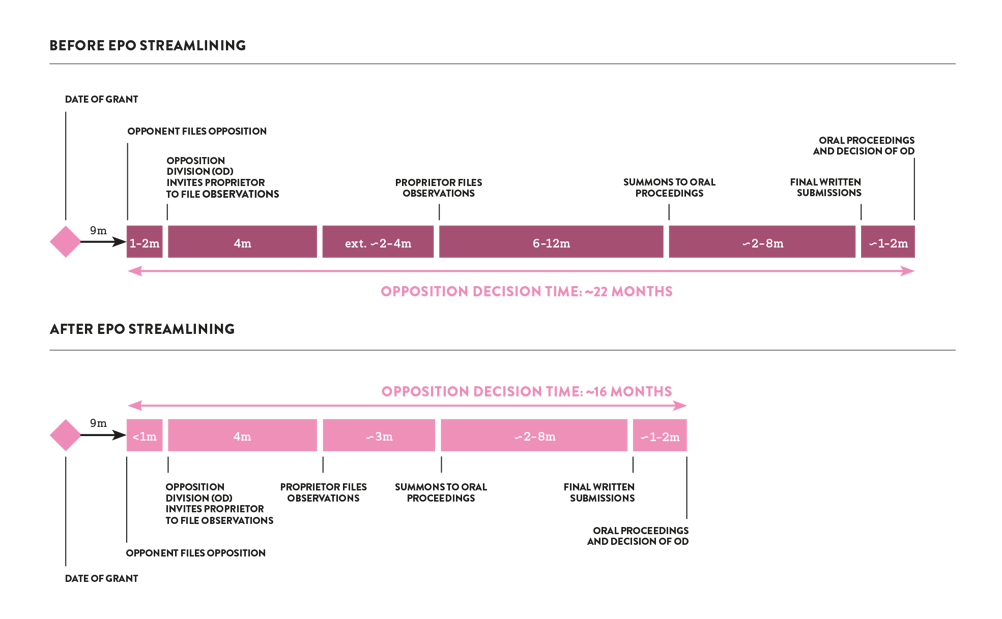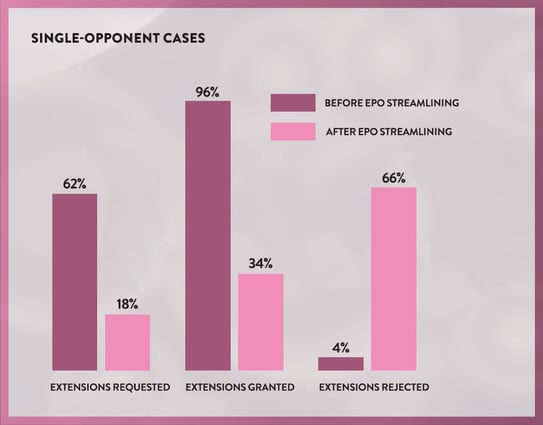
Our analysis of patent oppositions has revealed that early action has become imperative for patentees.
In July 2016, the European Patent Office (EPO) introduced a streamlined patent opposition procedure. This initiative was designed to simplify opposition proceedings and deliver decisions more quickly - and based on research Mewburn Ellis has carried out, it seems to have worked.
The mean time to receive a decision following the initial filing of an opposition was reduced from just over 22 months in 2015 (pre-streamlining) to 17 months in 2018.
Each stage of the opposition procedure is speeding up, according to our analysis - which involved examining more than 5,000 opposition cases filed at the EPO over the past ten years. For example, it now routinely takes about two to four weeks for the EPO to issue an invitation for a patentee to respond to an opposition. This previously took up to eight weeks, sometimes longer.
There has also been a big effect on extension of time requests. These can be helpful to patentees who need more than the standard four months to respond to an opposition. Looking at a snapshot of cases within a six-month time window straddling either side of the introduction of the streamlining initiative in mid-2016, we saw stark differences.
Prior to the streamlining initiative, most patentees (68%) secured a two-month extension of time and filed their response within four to six months of the EPO invitation. A significant proportion (12%) responded more than six months after the EPO's invitation. By contrast, after the streamlining initiative, a minority of patentees (15%) secured a two-month extension of time, and responses filed more than six months after the EPO's invitation to respond were very rare (just under 2%).
An even more dramatic pattern appears if we focus on opposition cases involving a single opponent. Whereas before streamlining more than two-thirds (69%) of patentees filed their response within four to six months of being invited, and 9% later than that, after streamlining a mere 8% of responses were filed within four to six months, and 0.6% later than that.

The mean time to receive a decision following the initial filing of an opposition has reduced from just over 22 months in 2015 (pre-streamlining) to 17 months in 2018.

Following the streamlining initiative, only 34% of requests for a two-month extension were granted in single-opponent cases.
By contrast, 96% of requests were granted before the changes.
Key question
This raises a question: has the EPO become stricter about granting requests by patentees for extensions of time, or are patentees less likely to ask for an extension in the first place?
Our analysis showed that the answer is both, says Mewburn Ellis partner Emily Hayes. 'Not only is the EPO much less likely to allow requests for an extension of time by the patentee, especially for single opponent cases, but patentees are also much less likely to request an extension of time, perhaps feeling that there's little point in doing so.'
Following the streamlining initiative, only 34% of requests for a two-month extension were granted in single-opponent cases. By contrast, 96% of requests were granted before the changes.
In addition, fewer patentees are seeking an extension of time in order to respond to oppositions by single opponents, with extensions now being requested in just 18% of cases. Previously, extensions of time were requested in 62% of cases.
From information to action
What does this mean for patentees? Arguably, the acceleration that our research has uncovered may benefit opponents and the public by helping to provide legal certainty at an earlier stage. However, the compressed timeline places greater pressure on patentees to prepare their defences more quickly.
Most will have less time available to generate new data or to provide expert declarations - whereas the amount of time afforded to opponents to prepare their oppositions (nine months from grant) hasn't changed. Taking early, pre-emptive action is now more important than ever.
Download our full research report here.

This article was orginally published in the third edition of Mewburn Ellis Forward — a biannual publication that celebrates the best of innovation and exploration.
Subscribe to Mewburn Ellis Forward here.
Katherine is a Partner and Patent Attorney at Mewburn Ellis. She specialises in EPO oppositions and appeals, particularly defending patents in complex opposition cases involving very large numbers of opponents. Katherine advises on European prosecution strategies for many important patent families, particularly divisional strategies for opposed patents. Her prosecution work includes advising on securing grant for the high-profile family of cases protecting CRISPR/Cas platform technology invented by Jennifer Doudna and Emmanuelle Charpentier.
Email: katherine.green@mewburn.com
Sign up to our newsletter: Forward - news, insights and features
Our people
Our IP specialists work at all stage of the IP life cycle and provide strategic advice about patent, trade mark and registered designs, as well as any IP-related disputes and legal and commercial requirements.
Our peopleContact Us
We have an easily-accessible office in central London, as well as a number of regional offices throughout the UK and an office in Munich, Germany. We’d love to hear from you, so please get in touch.
Get in touch

